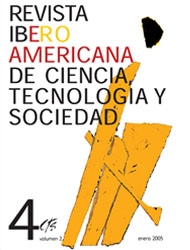Biotechnology and the Media in Spain
DOI:
https://doi.org/10.52712/issn.1850-0013-1029Keywords:
biotechnology, public attitudes, scientific culture, media agendaAbstract
In general terms, Spaniards show more optimistic and favourable attitudes towards biotechnology than the average of European citizens, although their attitude is of greater distrust and disagreement, when dealing with specific applications. In any case, the level of information and implication of Spaniards in the public debate on scientific and technological subjects seems to be traditionally low. Nevertheless, analysing the presence of biotechnology in the electronic archives of two national newspapers (El Mundo and El País) and of the state news agency EFE, in the last eight years, we have verified that many of the most relevant biotechnological applications have not gone unnoticed in the media agenda. The presence of biotechnology in the media has tripled in eight years and biotechnology is now a daily interest subject. This allows us to foresee an undergoing deep maturation of Spaniards’ biotechnological culture and that this process will probably lead to a greater polarization of their opinions and attitudes on biotechnological controversial issues.
Downloads
References
AIBAR, A. (2003): “La comprensión pública de la ciencia y la tecnología”, en A. Aibar y M. A Quintanilla, Cultura Tecnológica, Barcelona, Horsori-ICE-Universidad de Barcelona, pp.127-46.
BORRILLO, D. [comp.] (1996): Genes en el estrado: límites jurídicos e implicaciones sociales del desarrollo de la genética humana, Madrid, Consejo Superior de Investigaciones Científicas.
GASKELL, G.; ALLUN, N. y STARES, S. (2003): “Europeans and Biotechnology in 2002”, Eurobarometer 58.0, European Commission.
GENOMA ESPAÑA (2004): Avance del Estudio Estratégico de la Biotecnología en España: descripción e Indicadores, Madrid.
HUMANES, M. L. et al. (2001): “La información sobre ciencia y tecnología en la prensa española. Un análisis de contenido de los diarios El País y El Mundo”, ponencia en el I Congreso Ibérico de Comunicación: la sociedad de la comunicación en el siglo XXI, Málaga, Mayo.
LUJAN, J. L. y TODT, O. (2000): “Perceptions, attitudes and ethical valuations: the ambivalence of the public image of Byotechnology in Spain”, Pulic Understanding of science, 9, pp. 383-392.
MILLER, J. D.; PARDO, R. y NIWA, F. (2000): Public perceptions of science and technology. A comparative study of European Union, the United States, Japan and Canada, Madrid, Fundación BBV.
MORENO, C. (2001): “La Biotecnología en la prensa diaria (1988-1998): Análisis y Tendencias”, Tesis, Universidad Complutense.
MORENO, C. (2004): “Medios de comunicación e información científica”, Sistema, 179-180, Marzo, Fundación Sistema.
MORENO, L. (1996): “La Opinión pública y los avances en genética”, en Daniel Borrillo (comp.), Genes en el estrado: límites jurídicos e implicaciones sociales del desarrollo de la genética humana, Madrid, Consejo Superior de Investigaciones Científicas.
MUÑOZ, E. (1998): “La complejidad de la biotecnología y la percepción pública: una inevitable relación”, Quark, 12, pp. 14-18.
MUÑOZ, E. (2002a): “La cultura científica, la percepción pública y el caso de la biotecnología”, ponencia presentada en el Seminario La cultura científica en la sociedad de la información, Oviedo, Mayo.
MUÑOZ, E. (2002b): “Percepción Pública y Biotecnología. Patrón de conflicto entre información, conocimiento e interés”, en E. Ibáñez, Plantas transgénicas: de la ciencia al derecho, Granada, pp. 111-139.
PLAZA, M. (2004): “Análisis de contenido sobre el tratamiento de las aplicaciones biotecnológicas en la prensa española”, Sistema, 179-180, Marzo, Fundación Sistema.
QUINTANILLA, M. A. (2003): “Cultura tecnológica”, en Aibar, A. y Quintanilla, M.A., Cultura tecnológica. Estudios de ciencia, tecnología y sociedad, Barcelona, Horsori-ICE -Universidad de Barcelona.
Downloads
Published
How to Cite
Issue
Section
License
Copyright (c) 2025 CC Attribution 4.0

This work is licensed under a Creative Commons Attribution 4.0 International License.
All CTS's issues and academic articles are under a CC-BY license.
Since 2007, CTS has provided open and free access to all its contents, including the complete archive of its quarterly edition and the different products presented in its electronic platform. This decision is based on the belief that offering free access to published materials helps to build a greater and better exchange of knowledge.
In turn, for the quarterly edition, CTS allows institutional and thematic repositories, as well as personal web pages, to self-archive articles in their post-print or editorial version, immediately after the publication of the final version of each issue and under the condition that a link to the original source will be incorporated into the self-archive.











